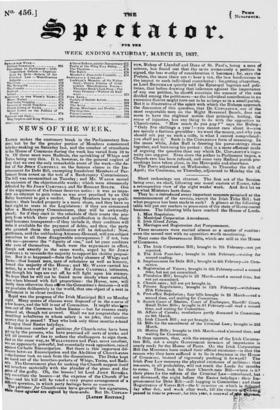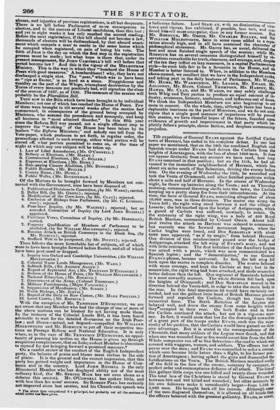Short reckonings are clearest. The first act of the Session
being over, we shall, following our usual custom at Easter, take a retrospective view of the eight weeks' work. And first let us see what Ministers have done.
They hiv.a introduced every important measure promised at the commencement of the session, except the Irish Tithe Bill ; but what progress has been male in each? A glance at the following table will put our readers in possession of the state of Government business. The following bills have reached the House of Lords.
1. Mint Regulation.
2. Municipal Corporation Amendment.
3. Irish Grand Juries.
4. Marriages and Registration Act Postponement. These measures were carried almost as a matter of routine: even the second met with no opposition worth mentioning.
Next come the Government Bills, which are still in the House of Commons.
1. The Irisb Corporation Bill; brought in 7th February—not yet reported.
2. The Irish Poor-law; brought in 14th February—waiting for second reading. 3. Imprisonment for Debt Bill ; brought in 6th Febreary—in Com- mittee.
4. Registration of Voters; brought in 6th February—read a second time, but not yet committed. 5. Pluralities Bill ; brought in 2d March—read a second time, but not yet committed. 6. Church-rates ; bill not yet brought in. 7. Prisons Regulations; brought in 12th February—withdrawa 27th February. 8. Post-office Regulation ; four bills brought in 2d March—read a second time, and waiting for Committee.
9. Scotch Court of Session, Court of Exchequer, Sheriffs' Court, Small Debts Bills ; brought in 31 February—all read a second time, and waiting for Committee. 10. Affairs of Canada; resolutions partly discussed in Committee on 9th March. II. Irish Church Bill ; not yet brought in.
12. Bills for the amendment of the Criminal Law; brought in 23d March.
13. Mutiny Bills • brought in 18th March—read a:second time, and waiting for Committee.
It thus appears, that, with the exception of the Irish Corpora- tion Bill, not a single Government measure of importance is nearly ready for the House of Peers. Oa the Irisli Corporation Bill the Ministers have staked their official existence—is that the reason why they have suffered it to lie in abeyance in the House of Commons, instead of vigorously pushing it forward? The Irish Poor Law concerns the physical existence of millions: that measure, in all probability, will not reach the Lords for months to come. Then, look for their Church•rate Bill—where is it? their plans for the refOrm of the Criminal Law—introduced, but • not discussed, the night before the Easter holydays : their Im- prisonment for Debt Bill—still lagging in Committee : and their Registration of Voters Bill—the CS mituatee on which is de ed Jay after day, and week after week, till the chance passed in time to prevent, for thia year, a renewal of
*mg
tr•Pe664 abuses, and injustice of previous registrations, is all but desperate. There is no Ijill before Parliament of more consequence to electors, and to the success of Liberal candidates, than this last ; and yet in eight weeks it has only reached the second reading. Before the next registration, if this bill should not become a law, thousands of electors will be disfranchised, by that absurd enact- ment which compels a man' to reside in the same house which. be occupied when registered, on pain of losing his vote. The 20th ofJune is the day on which the first step in the registration process must be made ; but what hope is there that, under its present management, Sir JonN CAMPBELL'S bill will before that period become law ? And this is the vigour of the MELBOURNE Ministry. This is the way in which they "bombard the House of Peers with good measures." A bombardment! why, they have not diseharged a single shot. The "pear," which was to have been so" ripe at Easter," is as hard as a stone. Sluggishness and timidity on the part of the Whigs, triumphant destruction by the Tories of every measure not positively bad, will signalize the close of the session of 1837, as of 1836. The measure of the session will probably be the Pluralities Bill.
Turn now to the Bills which have been brought in by individual Members; not one of which has reached the House of Peers. Few of them were brought in till several weeks after the session had commenced, in consequence of the ground being occupied by Ministers, who assume the precedence and monopoly, and keep all business in "most admired disorder." In this fifth year since the Reform Bill was passed, not a single efficient step to improve the " working " of the House has been taken by its leaders "the Reform Ministers;" and nobody can tell from the Vote-paper, which professes to set forth, in regular order, the proceedings allotted to each evening, either what portion will be staved off, what portion permitted to come on, or the time of night at which any one subject will be taken up.
1. Law of Libel Amendment, (Mr. O'CONNELL.) 2. Bribery at Elections, (Mr. HARDY.) 3. Controverted Elections, (Mr. C. ROLLER,)
4. Expenses at Elections, (Mr. Hume.)
5. Rate-paying Clauses Abolition, (Mr. DUNCOMBE.) 6. Public Records, (Mr. BULLER.)
7. County Rates, (Mr. Hume.)
8. Public Walks, (Mr. BUCKINGHAM.)
Of the Motions to be brought forward by Members not con- nected with the Government, nine bare been disposed of.
1. Publication of Divisions in Committee, (by Mr. WARD); carried. 2. Ballot Bill, (by Mr. GROTE); rejected. 3. Modification of the Corn-laws, (by Mr. CLAY); rejected. 4. Exclusion of Bishops from Parliament, (by Mr. C. LuSuiNc- TON) : rejected. 5. Poor.laws Inquiry, (by Mr. WALTER) ; rejected; but an amended Committee of Inquiry (by Lord JOHN RUSSELL) appointed.
6. Fictitious Votes, Committee of Inquiry, (by Mr. Honsatae); carried.
7. Property Qualification of Members of Parliament to be abolished, (by Sir WILLIAM MDLESWORTH); rejected. 8. Russian Attack on British Commerce in the Black Sea, (by Mr. Rot:twee); rejected. 9. Stafford Writ to be postponed, (by Mr. DivETT); rejected. Then follows the more formidable list of subjects, all of which were to have been brought forward before Easter, and all of which bare been post;:oned or dropped.
1. Inquiry into Oxford and Cambridge Universities, (Sir WILLIAM MoLEswoRTH.) 2. Colonial Waste Lands Management, (Mr. WARD.) Sabbath Bills, (Sir ANDREw AGNEw.) 4. Repeal of Septennial Act, (Mr. TF.NNYS0N D'EVNcouRT.)
5. Reform of the House of Peers, (Sir Winuaat Moettswonre.)
6. National Education' (Mr. Roteuce.)
7. Government of the Army, (Colonel Titostrsoe.) 8. Military Punishments, (Major Fascouar.)
9. Suppression of Mendicancy, (Mr. SCROPE.)
10. Welsh Bishops, (Mr. Ram.)
11. Repeal of the Duty on Raw Cotton, (Mr. MARK PHiLL1PS.) 12. Local Courts, (Mr. ROEBucK.) With the exception of Mr. TENNYSON DEYNCOURT, we are not aware that any Member who had the charge of one or more of the above motions can be blamed for not having made them. In the instance of the Colonial Lands Bill, it has been found advisable to wait for the detailed discussion on the Irish Poor. law ; and illness-actual, not feigned-compelled Sir WILLIAM Moteswonit and Mr. ROEBUCK to put off their respective mo- tions on Peerage Reform and National Education. It is only when, as in the case of Mr. TENNYSON D'EYNCOURT, an oppor- tunity of pressing his motion on the House is given up through suspicious complaisance, that an Inderendent Member is obnoxious to reproof for not bringing forward apromised measure.* On a candid review of the conduct of the English Independent party, the balance of praise and blame must incline to the side of praise. It is the general and the correct impression, that this party has gained weight and importance in the House of Com- mons and in the country. Lord JOHN RUSSELL is the only Ministerial Member who has displayed ability not of the most ordinary kid, (for Mr. SPRING Rica has not even shone as a debater this session). Mr. O'CONNELL has spoken little, and with less than his usual success. Sir ROBERT PEEL has certainly not improved since last session, and his Church-rate speech was • The above lists eomrrehend I.e principal, but probably not all the motions of sittleh notice has hen given.
a
a ludicrous failure. Lord STAN: KY, wall no diminution of viru- lence and vigour, has exhibited, if possible, less tact, and refl. tiered himself more unpopular, than in any former session. But Mr. ROEBUCK, Mr. GROTE, Mr. CHARLES BULLER, and Sir
WILLIAM MOLESWORTH, have in some cases added to a repu- tation already high, and in all have sustained the character of
philosophical statesmen. Mr. Gao.re has, as usual, delivered the
best and most finished single speech of the session; while Mr.. ROEBUCK has on several occasions distinguished himself by eb. serrations remarkable for truth, clearness, and courage, and, despite. of the tax they inflict on lazy reasoners, in a capital Parliamentary style-he even bids fair to be a favourite in the House, and ise Member is better listened to. When, in addition to the Members. above-named, we recollect that we have in the Independent ranks,. and taking part in the daily business of Parliament, Mr. WARE,
Mr. HOME, Mr. WARBURTON, Mr. LEADER, Mr. EWART, Mr, AGLIONBY, MT. HUTT, Colonel THOMpSON, Mr. HARVEY, Mr. HAWKS, Mr. CLAY, and Mr. Wssost, we may safely challenge both Whig and Tory parties to produce an equal amount of in- dustry, acuteness, honesty, usefulness, and influence out of doors.. We think the Independent Members are also beginning to act more in concert. On the whole, then, although there has been a deplorable inertness on the part of Ministers, and we do not anti- cipate that a single good measure of importance will be passed this session, we have cheerful hopes of the future, founded upon evidences of growth and improvement in that party which im- plicitly follows principle, shuns faction, and despises unreasoning. prejudice.



























